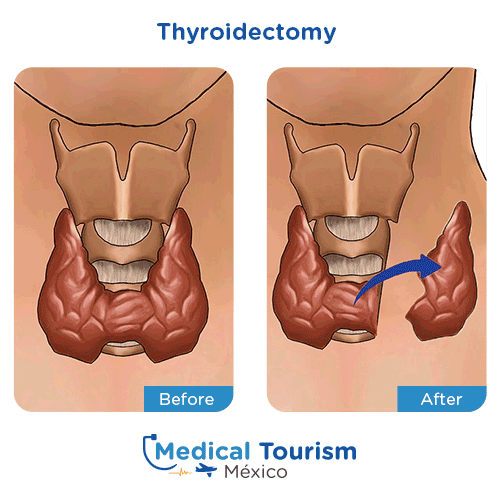The most reliable doctors in Mexico
Thyroidectomy information and locations in Mexico
A thyroidectomy is the surgical removal of all or a portion of the thyroid gland. This surgery
is performed to treat hyperthyroidism, goiter, thyroid nodules, or cancer.
The thyroid produces and controls the thyroid hormone, which controls your metabolism, heart
rate, and how fast you burn calories. Surgery is necessary when the thyroid is producing too
much thyroid hormone, it becomes larger or has a benign nodule. A thyroidectomy consists of the
surgical removal of the thyroid, depending on the condition, your ENT surgeon can remove a part
of the thyroid (partial thyroidectomy) or all of the gland (total thyroidectomy). Depending on
how much of the thyroid gland was removed, some patients might be required to start taking
thyroid hormone medication.
Surgical approaches to thyroidectomy
Traditional thyroidectomy
The traditional approach involves making an incision on the neck to access directly to
the thyroid gland.
Transoral thyroidectomy
This is a newer approach in which surgeons, access the thyroid gland through the mouth.
This method leaves no visible scars.
Endoscopic thyroidectomy
The endoscopic approach involves making a smaller incision on the neck. Using an
endoscope and small camera, surgeons can see the inside and remove the thyroid gland.
Schedule a thyroidectomy with the best otolaryngologists in Mexico!
Benefits
Prevents cancer
Relieves discomfort
Treats hormone overproduction
Relieves discomfort
Treats hormone overproduction
Thyroidectomy
Procedure:
2 - 3 hrs.
Hospital stay: 1 - 2 days
Cleared to fly: 5 -7 days
Hospital stay: 1 - 2 days
Cleared to fly: 5 -7 days
After surgery
Out of town patients’ follow-ups are scheduled with the ENT surgeon after 5 - 7 days of thyroidectomy surgery.
Patients are clear for flying after 10 days of the thyroidectomy surgery.
Note: Follow-ups can be arranged as face-to-face or virtually. If needed, you can go to your primary care physician to remove sutures or get medication adjustments.
As an Amazon Associate, we earn from qualifying purchases.
Take a look at one of our medical tourism essentials for ENT surgery.
Take a look at one of our medical tourism essentials for ENT surgery.
Additional images
View additional images for this procedure.

View more


Locations
Select the city of your choice to seethe doctors profile.
Cancún, Q. Roo.
Dra. María F. Medrano
View more

Thyroidectomy frequent questions
Get answers to our most frequently asked questions and what to expect after the procedure.
Am I a candidate for a thyroidectomy?
Thyroidectomy is recommended on patients with conditions like hyperthyroidism, enlargement of the thyroid, or nodules. We recommend you to refer to one of our ENT surgeons for an evaluation to determine if this surgery is best for you.
How do I prepare for a thyroidectomy?
As with any surgery, your otolaryngologist will perform a physical examination before the procedure, you will be asked to not eat or drink at least 8 hours before the procedure. Additionally, you may need to take some medication to control thyroid function.
What can I expect during recovery?
After surgery, some patients experience neck pain and hoarse or weak voice. These symptoms are often short-term. You’ll need to wait for 10 days before doing heavy lifting or strenuous sports.
Do I need to take hormonal supplements after the surgery?
This depends on how much of your thyroid gland was removed.
If you had a partial thyroidectomy, the remaining portion takes over the function of the entire gland, but if you had a total thyroidectomy, you will need to take thyroid hormone supplements. Your ENT surgeon will let you know how much you’ll be needing.
Recent news
Disclaimer: This information does not reflect the medical advice from our clinics. All cases are different and this treatment may not suit you. Always refer to a medical professional with the certification and experience. All of our physicians are fully qualified to perform these procedures. For more information and diagnosis contact one of our top specialized clinics.
In all medical procedures, there are chances of complications, the specialist will provide you detailed information about the risks of the procedure, talk to the specialist directly.
In all medical procedures, there are chances of complications, the specialist will provide you detailed information about the risks of the procedure, talk to the specialist directly.





